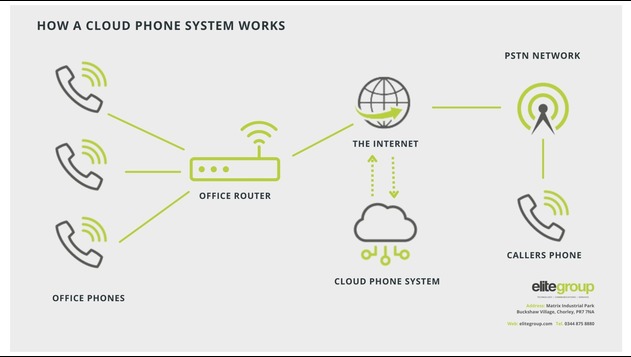Navigating Travel Industry Risks with Intelligent Communications
We’re going to explore some real-life unforeseen circumstances that the travel industry has had to navigate and how intelligent communications solut...
Your phone system is the voice of your business, so choosing the right system is crucial. An inefficient phone system prevents your team from communicating effectively with each other and your customers, hurting operations, productivity and the experience customers have with your business.
From enhanced features to improved flexibility and scalability, businesses that onboard cloud phone systems will enjoy a wide range of benefits as they make the move to VoIP (Voice Over Internet Protocol) telephony. If you’re considering implementing a cloud phone system within your business or you’re reviewing your options and want to know what this solution can offer you – you’re in the right place. Welcome to your complete guide to cloud phone systems – how they work, what they offer and how to find the best system for your business.

A cloud phone system allows your business to make and receive calls via the internet by hosting your business phone system in the cloud. This moves your business phone system away from on-premise infrastructure and into a virtual infrastructure that is Internet-based. Depending on your current phone provider, you may even be able to retain your existing business phone number. Cloud telephone systems are managed by a third-party provider, so there’s no need to employ a team to take care of your solution. Cloud-based phone systems are usually supplied on a cost-per-user model, which means you only pay for what you use and can easily add or remove users as necessary.
Voice Over Internet Protocol is the technology that makes a cloud phone system work. A consistent backbone of current business communications and unified communications systems, VoIP breaks down the analogue signals received during phone calls and converts them into digital signals that can be used in an internet-based phone system. Along with being far more efficient to transfer and otherwise manipulate through cloud phones, VoIP services also offer impressive and useful advanced features for business cloud phone systems. These include easier call forwarding, call recording, intelligent auto attendant and many more.
The first distinct difference is the infrastructure that powers the two systems. Traditional landline telephony solutions rely on an on-premise infrastructure that needs to be managed by the user and is powered by the PSTN – the legacy, analogue network made up of copper lines that will be switched off by 2025. In comparison, a cloud phone service relies on a virtual infrastructure that is hosted within the cloud, managed by a third-party provider and delivers and receives calls via the internet.
Traditional phone systems can only be accessed via a phone handset connected via a wire to the on-premise network. In comparison, a cloud telephone system can be accessed through various methods including:
Traditional telephony is difficult and time-consuming to scale, limiting your business’s flexibility and the ability to add or remove users easily. Customising a traditional phone system is complicated and expensive, as new physical lines often need to be installed to accommodate new users. In comparison, a cloud-based telephone system makes scaling much easier. As there is no physical infrastructure to modify, a new user is simply added to your account. All that’s left to do is connect your desk phone or softphone application to the phone system and away you go. Furthermore, as the solution is internet-based, users can access it from any location, which allows businesses to provide better flexibility for their teams.
Read More: The Evolution of Business Phone Systems

The first important requirement is a suitable broadband connection that can support the cloud phone system. If your broadband doesn’t have sufficient bandwidth to support the solution, you may not be able to take advantage of all the benefits a cloud phone system can provide. Running your cloud phone system on an efficient broadband connection will guarantee crystal clear voice calls and video calls, without buffering or loss of connection.
Most business broadband connections are capable of supporting cloud telephony, as they rely on a fast, fibre solution. However, if you find that your broadband connection isn’t currently up to the task, then moving to a solution with better bandwidth may be the first upfront cost you will have to consider. According to communications industry leader 8×8, VoIP telephone calls within a small business require a minimum download speed of between 5-25mbps. However, the number of VoIP phones, other devices and user numbers will greatly impact the specific speeds you will require. If you’re unsure whether your broadband is up to the job, speak to us today and we’d be happy to offer our advice.
The next requirement is a solution in which to access your cloud phone system, whether that be a VoIP-compatible/adapted desk phone or a softphone application that can be accessed via desktops and smartphones. If you already have VoIP-compatible phones within your business or you are planning on utilising laptops, PCs and mobile devices to access your phone system, then this isn’t a cost that you will have to factor in. If you’ve been relying on legacy technology to access your phone system in the past, then you will need to consider the cost of new desk phones or a solution to access your phone system.
Finally, you will need to purchase a cloud telephony package from a provider in order to access the solution itself. This will involve a monthly cost to your provider to manage your network, the user accounts that you need for your team, alongside any extra features that you want to include within your package.
Read More: Is Your Internet Connection Good Enough to Deliver VoIP?
So, now we’ve covered the basics of what a cloud phone system is, how it works and how it is different from traditional telephony, let’s get down to the important stuff – how it will benefit your business.
Finding the best cloud phone system for your business is only half of the task. In order to get the most out of your system, it is important that you integrate it within your business successfully.
Check existing speeds and analyse how running a cloud phone system would impact your connectivity to determine if it’s worth investing in a new broadband connection.
If you already have VoIP-ready hardware, this isn’t a cost that you will have to factor in, but if not, you will need to decide what solution you want to use to access your cloud phone system.
Not all cloud providers are created equal, so it’s important to shop around to ensure your provider offers all the features you require.
They’re going to be the people using your system, so it’s important that they are kept in the loop and are fully-trained to use the system when it is live.
Plan the process of integrating your new solution within your business, step by step including potential challenges you may face and how you plan to deal with them.
Once your new solution is live, run some tests internally to ensure everything is working as it should and prioritise any issues that need fixing.
Consistently review your solution to ensure it is always serving your needs and providing value to your business.

No solution is perfect and while the benefits of cloud systems undoubtedly outweigh any drawbacks, it is still important to consider them before making your next move.
A cloud solution is only as good as your internet connection, which means you will be reliant on a powerful, stable connection more than ever.
Ensuring your team all play their part in getting to know your new system and making the effort to utilise its features can be a challenge, so efficient communication during integration is vital. Resistance to new technology is common in business, but can be overcome with effective training and patience.
Moving your communication to the internet could open up potential vulnerabilities that cybercriminals can leverage, which means that you may need to invest in additional security solutions.
If you have a fully analogue system with no VoIP-compatible hardware, your initial start-up costs may be higher when switching to a cloud-based system. Though the benefits you will experience as a result will be well worth the investment.
When it comes to telecommunication solutions, we’re the experts. With over 20 years of experience in the industry, we’ve helped many businesses, like yours, unlock their potential by moving their communications to the cloud. Our team of specialists will work with you to understand your business and its needs before suggesting a cloud phone system package that meets those needs exactly. Contact us today for a no-obligation consultation and let’s work together to help you make the move to VoIP telephony with the best cloud phone system for your business.
Call 0344 875 8880 or fill out our contact form here.